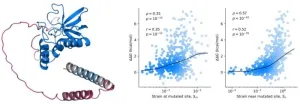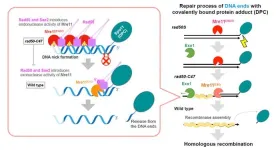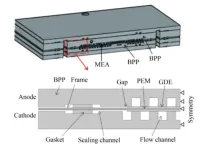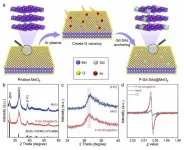(Press-News.org) There’s an urgent need for more careful antibiotic management to protect older people living in residential aged care from the dangerous spread of antibiotic resistant bacteria or ‘superbugs’, researchers from Flinders University and SAHMRI warn.
A new study published in the well-respected Journal of Infection, explores the link between the widespread use of antibiotics in residential aged care and the resulting antibiotic resistant bacteria in the gut that can be passed on to other residents.
“Commonly used tablet antibiotics in the elderly increase many types of resistance bacteria carried in the gut and these so called ‘superbugs’ can increase resistance to other important life-saving antibiotic drugs,” says lead author and PhD student, Sophie Miller.
“High rates of antibiotic prescriptions in aged care settings are likely to be contributing to the proliferation of these bugs, which can lead to longer hospital stays, higher medical costs and increased mortality.
“This trend not only compromises the effectiveness of antibiotic treatment but also poses a significant risk of treatment failures in an already vulnerable community.”
The World Health Organization names antibiotic resistance as one of the biggest threats to global health, food security, and development with a growing number of infections – including pneumonia, tuberculosis, gonorrhoea and salmonellosis – becoming harder to treat as antibiotics used to treat them become less effective.
“Responding effectively to the global health threat of antibiotic resistance requires a detailed understanding of the influence and impact of antibiotic prescribing patterns,” says Sophie Miller.
The researchers analysed stool samples collected from 164 residents from five long-term aged care facilities in South Australia to learn more about the genes carried by their gut bacteria that lead to antibiotic resistance.
“We discovered that an antibiotic commonly prescribed to aged care residents was strongly associated with an increase in resistance to other antibiotics the resident had not been prescribed,” she says.
Alarmingly, research revealed nearly all participants carried these resistant genes without displaying any symptoms, raising significant concerns for this particularly vulnerable demographic.
“Our findings suggest that even antibiotics that are not typically associated with major modifications in gut bacteria can significantly escalate the presence of resistance genes,” says Miller.
Senior author Professor Geraint Rogers, Director of the Microbiome and Host Health Program at SAHMRI and Matthew Flinders Fellow in the College of Medicine and Public Health at Flinders University, says the implications of this study extend beyond individual patient care.
“As the population ages and life expectancy extends, the implications of our findings emphasise the importance of a holistic approach to antibiotic management in long-term aged care settings,” says Professor Rogers.
“There are concerns that practitioners may be over prescribing antibiotics, potentially increasing the risk of resistant bacterial infections, and this study’s findings suggest a need for extra caution when prescribing them for older patients.”
The article, Exposure to doxycycline increases risk of carrying a broad range of enteric antimicrobial resistance determinants in an elderly cohort by Lucy Carpenter, Sophie Miller, Erin Flynn, Jocelyn M. Choo, Josephine Collins, Andrew P. Shoubridge, David Gordon, David J. Lynn, Craig Whitehead, Lex E.X, Leong, Kerry L. Ivey, Steve L. Wesselingh, Maria C. Inacio, Maria Crotty, Lito E. Papanicolas, Steven L. Taylor and Geraint B. Rogers has been published in the Journal of Infection DOI: 10.1016/j.jinf.2024.106243
Acknowledgements: This research was supported by an Australian Medical Research Future Fund (MRFF) grant from the Australian Department of Health (GNT1152268).
END
Waging war on ‘superbugs’ in aged care
A new study explores the link between the widespread use of antibiotics in residential aged care and the resulting antibiotic resistant bacteria in the gut that can be passed on to other residents
2024-08-29
ELSE PRESS RELEASES FROM THIS DATE:
Increasing risk of synthetic opioid drug overdoses in Australia
2024-08-29
A recent study has uncovered alarming insights into the dangers posed by fentanyl-contaminated drug supplies in Australia, including a heightened risk of lethal overdose.
The study, titled ‘The gear could be cut with fentanyl which is starting to happen more in Australia’: Exploring Overdose Survivors’ Perspectives on Toxic Supply and Safe Consumption, aimed to explore the role of synthetic opioids in overdoses among Queenslanders.
Led by Griffith University’s Dr Timothy Piatkowski, Emma Kill and Steph Reeve in partnership with the Queensland ...
Protein mutant stability can be inferred from AI-predicted structures
2024-08-29
Researchers at the Center for Algorithmic and Robotized Synthesis within the Institute for Basic Science have taken a significant step forward in understanding the stability of proteins by leveraging the power of AI. The research team used AlphaFold2 to explore how mutations affect protein stability—a crucial factor in ensuring proteins function correctly and do not cause diseases like Alzheimer's.
DeepMind’s AlphaFold algorithm, which can accurately predict a protein’s structure from ...
Shedding light on the mechanism of yeast DNA repair
2024-08-29
DNA damage is a cellular phenomenon that introduces structural abnormalities in double-stranded DNA. External factors, such as radiation or chemical agents, as well as internal factors, such as blocked DNA replication, can generate double-strand breaks (DSBs) in DNA. To counteract DNA damage, cells engage in DNA repair to preserve genetic integrity and ensure cell survival as failure to repair DSBs has serious health complications like increased risk of cancer.
DSBs are repaired by two mechanisms called non-homologous end joining (NHEJ) and homologous recombination (HR). NHEJ is the predominant DNA repair mechanism in human somatic cells and is ...
Improvement of durability of membrane electrode assembly by frame sealing structure in temperature shock
2024-08-29
Fuel cells offer a promising solution for clean energy with advantages over traditional electric power systems, including extended driving range and higher energy density. Despite these benefits, the high costs and durability concerns associated with fuel cell stacks have limited their commercialization. The durability of membrane electrode assemblies (MEAs), a key component of proton exchange membrane fuel cells (PEMFCs), is particularly affected by the frame sealing structure, which is often overlooked in research.
The study, conducted by Tiankuo Chu ...
Rare earth single atoms enhance manganese oxide's electrochemical oxygen evolution
2024-08-29
An international group of researchers has developed a novel approach that enhances the efficiency of the oxygen evolution reaction (OER), a key process in renewable energy technologies. By introducing rare earth single atoms into manganese oxide (MnO2), the group successfully modulated oxygen electronic states, leading to unprecedented improvements in OER performance.
Their findings were published in the journal Nano Energy on June 10, 2024.
Transition-metal-based oxides have been widely explored for their potential as active OER catalysts. However, the capacity of these catalysts is hindered by the adsorbate evolution mechanism, which ...
Gria: An efficient deterministic concurrency control protocol
2024-08-29
The concurrency control in deterministic databases, i.e., deterministic concurrency control, ensures that each transaction batch produces a unique result. In this way, replicas can process transactions in batches without communicating with each other to ensure consistency, which is simpler and more efficient than non-deterministic databases in achieving high availability through replication.
Early deterministic concurrency control protocols, e.g. Calvin, Bohm, PWV, rely on the prior knowledge of the read-write set, which is impractical in most scenarios. The state-of-the-art Ari breaks this limitation. However, Aria has three issues. First, ...
NSF grants $22 million for 'extreme microbe' lab collaboration
2024-08-29
The National Science Foundation has announced a $22 million grant to establish a “BioFoundry” laboratory for the study of extreme microorganisms with collaborating facilities at UC Riverside, UC Santa Barbara, and Cal Poly Pomona.
The BioFoundry for Extreme and Exceptional Fungi, Archaea, and Bacteria, or ExFAB, will focus on developing techniques to learn from nature’s more unusual microorganisms. These microbes are considered “extreme” because they have unusual nutritional requirements, grow at extremely high or low temperatures, or grow without ...
UC Santa Barbara to lead $22M NSF-funded center on exceptional microbes
2024-08-29
(Santa Barbara, Calif.) — This week, the National Science Foundation announced the award of a six-year, $22M grant to UC Santa Barbara under its biofoundries program for the establishment of the BioFoundry for Extreme and Exceptional Fungi, Archaea and Bacteria (ExFAB), a collaboration led by UC Santa Barbara (UCSB), together with UC Riverside (UCR), and Cal Poly Pomona (CPP). ExFAB establishes the nation’s first biofoundry that focuses on largely untapped and unexplored extreme microbes. UCSB's award is one of only five grants made under NSF's BioFoundry program during this funding cycle, which awarded ...
Misconceptions about dyslexia among professionals risk children being misdiagnosed
2024-08-29
Misconceptions about dyslexia are held by professionals who assess children for the learning difficulty, according to a new study which calls for evidence-based standardised assessment procedures.
The research, led by Durham University, found that almost half of dyslexia professionals in the study believed at least one unproven indicator for dyslexia, which could lead to children being misdiagnosed.
In a survey of 275 dyslexia professionals, the most common myth – which is not backed up by solid evidence – was that people with dyslexia read letters in reverse order, believed by 61 per cent of specialists.
Just over 30 per cent of professionals also ...
Breakthrough in semiconductor patterning: New block copolymer achieves 7.6 nm line width
2024-08-29
A recently developed block copolymer could help push the limits of integration and miniaturization in semiconductor manufacturing, report scientists in Tokyo Tech and TOK. Chemically tailored for reliable directed self-assembly, the proposed compound can arrange itself into perpendicular lamellar structures whose half-pitch width is less than 10 nanometers, outperforming conventional and widely used block copolymers.
Miniaturization is one of the fundamental qualities of modern electronics and is largely responsible for the incredible increments in performance witnessed ...
LAST 30 PRESS RELEASES:
Fecal transplants from older mice significantly improve ovarian function and fertility in younger mice
Delight for diastereomer production: A novel strategy for organic chemistry
Permafrost is key to carbon storage. That makes northern wildfires even more dangerous
Hairdressers could be a secret weapon in tackling climate change, new research finds
Genetic risk for mental illness is far less disorder-specific than clinicians have assumed, massive Swedish study reveals
A therapeutic target that would curb the spread of coronaviruses has been identified
Modern twist on wildfire management methods found also to have a bonus feature that protects water supplies
AI enables defect-aware prediction of metal 3D-printed part quality
Miniscule fossil discovery reveals fresh clues into the evolution of the earliest-known relative of all primates
World Water Day 2026: Applied Microbiology International to hold Gender Equality and Water webinar
The unprecedented transformation in energy: The Third Energy Revolution toward carbon neutrality
Building on the far side: AI analysis suggests sturdier foundation for future lunar bases
Far-field superresolution imaging via k-space superoscillation
10 Years, 70% shift: Wastewater upgrades quietly transform river microbiomes
Why does chronic back pain make everyday sounds feel harsher? Brain imaging study points to a treatable cause
Video messaging effectiveness depends on quality of streaming experience, research shows
Introducing the “bloom” cycle, or why plants are not stupid
The Lancet Oncology: Breast cancer remains the most common cancer among women worldwide, with annual cases expected to reach over 3.5 million by 2050
Improve education and transitional support for autistic people to prevent death by suicide, say experts
GLP-1 drugs like Ozempic could cut risk of major heart complications after heart attack, study finds
Study finds Earth may have twice as many vertebrate species as previously thought
NYU Langone orthopedic surgeons present latest clinical findings and research at AAOS 2026
New journal highlights how artificial intelligence can help solve global environmental crises
Study identifies three diverging global AI pathways shaping the future of technology and governance
Machine learning advances non targeted detection of environmental pollutants
ACP advises all adults 75 or older get a protein subunit RSV vaccine
New study finds earliest evidence of big land predators hunting plant-eaters
Newer groundwater associated with higher risk of Parkinson’s disease
New study identifies growth hormone receptor as possible target to improve lung cancer treatment
Routine helps children adjust to school, but harsh parenting may undo benefits
[Press-News.org] Waging war on ‘superbugs’ in aged careA new study explores the link between the widespread use of antibiotics in residential aged care and the resulting antibiotic resistant bacteria in the gut that can be passed on to other residents






